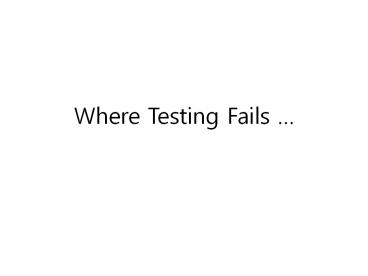Where%20Testing%20Fails%20 PowerPoint PPT Presentation
Title: Where%20Testing%20Fails%20
1
Where Testing Fails
2
Problem Areas
- Stack Overflow
- Race Conditions
- Deadlock
- Timing
- Reentrancy
3
Stack Overflow
- Stack
- local variables
- parameter passed, return address
- register saved
- scratch pad for a compiler
- Problem
- the size of a stack is nondeterministic
- the memory is limited
4
Stack Overflow
- Static analysis of stack depth
- use a call tree
- if an ISR use its own stack, add them at the
leaves - stack depth of the ISR
- space to save the context of the running thread
- stack used by RTOS
- Problem
- source code is necessary
- run time library is difficult to analyze
- Java, C entails hidden stacks
5
Stack Analysis
6
Stack Analysis
- What if you dont have the source code?
- Measuring Stack size
- fill a large area with -1 for stacks
- Recovery
- protect important code in protected pages
- stack resizing
- Stack Usage Information
- code, library, compiler change
- Life critical systems need formal proof OR
sufficient stack space
7
Race Conditions
- major source of bugs!!!
- extern float shared_sensor void
Update_Sensor(float offset, float
scale) float temp get_raw() temp
scale temp offset shared_sensortemp
- old value may be read by another thread
- if bus is not 32-bit, partial value may be read
8
Race Condition
- fixing the problem is easy
- mutex
- use a message instead of shared data
- finding them is extremely difficult
- find shared data
- find if there are conflict accesses to it
- what about a pointer?
- ISR is inside the kernel
9
Deadlock
- mutex/messages may lead to deadlock
- conditions
- mutex
- nonpreemption
- hold and wait
- circle
- Solutions
- break any one of the conditions
10
Deadlock
- there are many heuristics
- when you wait on a blocked thread, release what
you have - acquire all locks before it begins
- acquire locks in a preset order
- detecting and recovery is expensive
- static detection is not practical
- every wait should be recorded to find a circle
- abort a thread (which one?)
11
Timing Problem
- Priority Inversion
- Processor Utilization
- worst case analysis is more important (tbl 1)
- Schedulability bound
- is it important?
- WCE time
- cache effect
- interrupts may be double counted
- I/O, paging, system call, malloc, library calls,
blocking, . - for hard real time, remove these factors if
possible
12
Interrupts and events
- Execution of each ISR needs to be analyzed
- Response time for an event
- interrupt latency (hw latency context s/w)
- WCE time of the ISR
- what if the CPU was sleeping?
- what if the interrupt was masked out?
- More general system incorporates the event queue
- events are stored in a queue for later processing
13
Others
- Watchdog
- a timer to reboot when the system get into a
crazy state - issue frequent false positives
- Reentrancy
- do not modify anything local
- do not cause device state changes
- mostly caused by ISR

